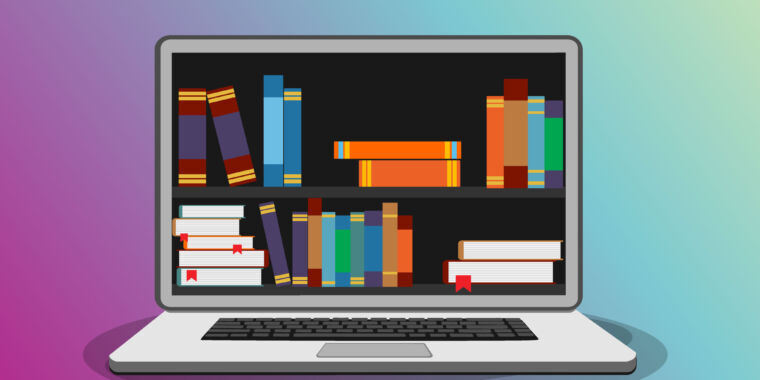In an open letter to publishers, more than 30,000 readers, researchers, and authors begged for access to the books to be restored in the open library, claiming the takedowns dealt “a serious blow to lower-income families, people with disabilities, rural communities, and LGBTQ+ people, among many others,” who may not have access to a local library or feel “safe accessing the information they need in public.”
During a press briefing following arguments in court Friday, IA founder Brewster Kahle said that “those voices weren’t being heard.” Judges appeared primarily focused on understanding how IA’s digital lending potentially hurts publishers’ profits in the ebook licensing market, rather than on how publishers’ costly ebook licensing potentially harms readers.



But there’s a very clear distinction in the law. Libraries are covered under first sale doctrine. You can do effectively what you want with a physical object that contains copyrighted material placed there by the owner.
Digital anything is not covered by the first sale doctrine. Every individual loan is a copy. Every time a “copy” moves between devices is a copy. There is no legal framework for ownership of anything digital. It’s always a license, no matter what permissions that license grants you.
You have to pass new laws to match the digital world. Under the current laws, it’s extremely clear that lending unauthorized digital copies of a physical book is copyright infringement. Wholesale copies of a work aren’t even in the neighborhood of fair use, especially when you’re distributing a bunch of them. DRMing those copies is completely irrelevant legally.
So this is basically why ebooks are problematic at libraries then? That issue alone really seems like it needs a legal update.
Yep. Libraries can’t just buy an ebook like they can buy a book. They have to negotiate a contract with the copyright holder to be able to lend them out.
The IAs point is that they should not have to do that, partly because of first sale doctrine. They bought each ebook, and only lend out that copy, the exact same as libraries do now.
1 bought copy, 1 lend. That’s a fair and simple system that mimics hundreds of years of physical book lending.
Their other point is that the societal goo of allowing anyone in the world to educate themselves for free far, far outweigh the value of monetary gain for publishers. Since copyright is intended to help society, their interpretation is the better application of it.
Then write new laws. Digitizing the book is already relying on fair use. Judges aren’t lawmakers, and this case doesn’t have the tiniest hint of the tiniest shred of a leg to stand on.
There is no first sale doctrine for digital. There is no such thing as ownership of a “digital copy” to begin with. The framework doesn’t exist. You have a license.
Again, it’s their point that they dont need to change the law, just that the law should just be applied better.
Thats what the court will decide.
There’s no possible way to apply the law where the Internet Archive is permitted to do their lending program. It very clearly is illegal copyright infringement that does not come anywhere close to fair use.
The judges do not have the authority to completely overrule both the text of the law and the massive body of precedent. The Supreme Court could, except the Constitution explicitly grants Congress the right to regulate IP how they see fit, and the law is super clear that you can’t do anything that resembles what IA is doing in any way.
You can use your library card to login to Libby and check out ebooks.
Because the libraries have explicit licenses from the IP holders.
You can check an eBook out, but there are examples of issues, something like the library can only do it five times or whatever. It isn’t treated like an actual book. I don’t know the details but there are problems with eBook rentals.
There’s always piratebay.
They did—it’s called the DMCA, and it’s working exactly as they intended it to.
I really don’t think anyone envisioned the way digital distribution would change when the DMCA was written.
But my point isn’t that there’s political will to make a change, but that the judiciary really doesn’t have the capacity to rule any other way than the obvious “you can’t do this”. It would be a completely wild precedent for this case to somehow result in a ruling that it’s fair use based on the actual law and the history of previous rulings.
Some digital libraries have systems set up to lend you a book for X number of hours for free, making it both limited and accessible at the same time. Are those treated as regular libraries?
deleted by creator
The Internet Archive had a system in place specifically to ensure that they had a legal license for each copy of the book loaded out digitally at any given time. This essentially made it a library.
During the lockdown, they intentionally stopped using this system and loaned out unlimited copies. They didn’t just violate copyright in accident, they willfully and intentionally disabled their own systems designed to preserve copyright.
I think the publishers suck too, but the Internet Archive humped the bunk on this one.
deleted by creator
They waited until they were sued to stop.
If you get caught speeding, the judge doesn’t throw out the ticket because you slowed down as the cop pulled you over.
deleted by creator
The encryption is literally entirely irrelevant.
The argument that a copy in your browser is legally defensible is the equivalent of claiming that sites can legally stream movies to you. It is a copy, both legally and in reality.
deleted by creator